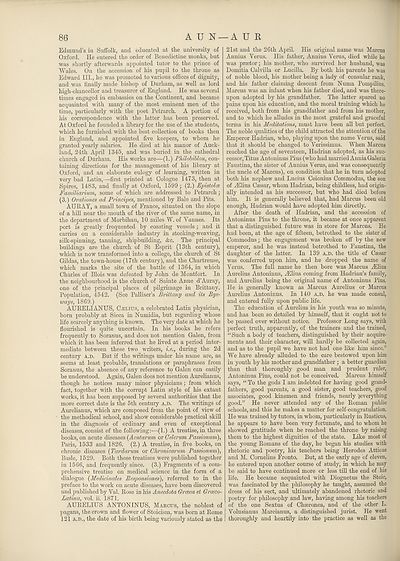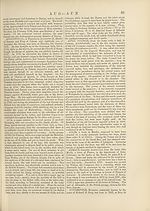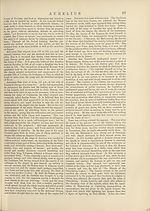Encyclopaedia Britannica > Volume 3, Athens-BOI
(98) Page 86 - AUN
Download files
Complete book:
Individual page:
Thumbnail gallery: Grid view | List view

86 A U N -
Edmund’s in Suffolk, and educated at the university of
Oxford. He entered the order of Benedictine monks, but
was shortly afterwards appointed tutor to the prince of
Wales. On the accession of his pupil to the throne as
Edward III., he was promoted to various offices of dignity,
and was finally made bishop of Durham, as well as lord
high-chancellor and treasurer of England. He was several
times engaged in embassies on the Continent, and became
acquainted with many of the most eminent men of the
time, particularly with the poet Petrarch. A portion of
his correspondence with the latter has been preserved.
At Oxford he founded a library for the use of the students,
which he furnished with the best collection of books then
in England, and appointed five keepers, to whom he
granted yearly salaries. He died at his manor of Auck¬
land, 24th April 1345, and was buried in the cathedral
church of Durham. His works are—(1.) Philobiblon, con¬
taining directions for the management of his library at
Oxford, and an elaborate eulogy of learning, written in
very bad Latin,—first printed at Cologne 1473, then at
Spires, 1483, and finally at Oxford, 1599 ; (2.) Epistolce
Familiarium, some of which are addressed to Petrarch;
(3.) Orationes ad Principes, mentioned by Bale and Pits.
AUBAY, a small town of France, situated on the slope
of a hill near the mouth of the river of the same name, in
the department of Morbihan, 10 miles W. of Vannes. Its
port is greatly frequented by coasting vessels; and it
carries on a considerable industry in stocking-weaving,
silk-spinning, tanning, shipbuilding, &c. The principal
buildings are the church of St Esprit (13th century),
which is now transformed into a college, the church of St
Gildas, the town-house (17th century), and the Chartreuse,
which marks the site of the battle of 1364, in which
Charles of Blois was defeated by John de Montfort. In
the neighbourhood is the church of Sainte Anne d’Auray,
one of the principal places of pilgrimage in Brittany.
Population, 4542. (See Palliser’s Brittany and its Bye-
ways, 1869.)
AUBELIANUS, Geliits, a celebrated Latin physician,
born probably at Sicca in Numidia, but regarding whose
life scarcely anything is known. The very date at which he
flourished is quite uncertain. In his books he refers
frequently to Soranus, and does not mention Galen, from
which it has been inferred that he lived at a period inter¬
mediate between these two writers, i.e., during the 2d
century a.d. But if the writings under his name are, as
seems at least probable, translations or paraphrases from
Soranus, the absence of any reference to Galen can easily
be understood. Again, Galen does not mention Aurelianus,
though he notices many minor physicians; from which
fact, together with the corrupt Latin style of his extant
works, it has been supposed by several authorities that the
more correct date is the 5th century a.d. The writings of
Aurelianus, which are composed from the point of view of
the methodical school, and show considerable practical skill
in the diagnosis of ordinary and even of exceptional
diseases, consist of the following:—(1.) A treatise, in three
books, on acute diseases (Acutarum or Celerum Passionum),
Paris, 1533 and 1826. (2.) A treatise, in five books, on
chronic diseases {Tardarum or Ckronicarurn Passionum),
Basle, 1529. Both these treatises were published together
in 1566, and frequently since. (3.) Fragments of a com¬
prehensive treatise on medical science in the form of a
dialogue (Medicinales Responsiones), referred to in the
preface to the work on acute diseases, have been discovered
and published by Val. Rose in his Anecdota Grceca et Groeco-
Latina, vol. ii. 1871.
AURELIUS ANTONINUS, Marcus, the noblest of
pagans, the crown and flower of Stoicism, was born at Rome
121 a.d., the date of his birth being variously stated as the
-A U R
21st and the 26th April. His original name was Marcus
Annius Yerus. His father, Annius Verus, died while he
was prsetor; his mother, who survived her husband, was
Domitia Calvilla or Lucilla. By both his parents he was
of noble blood, his mother being a lady of consular rank,
and his father claiming descent from Numa Pompilius.
Marcus was an infant when his father died, and was there¬
upon adopted by his grandfather. The latter spared no
pains upon his education, and the moral training which he
received, both from his grandfather and from his mother,
and to which he alludes in the most grateful and graceful
terms in his Meditations, must have been all but perfect.
The noble qualities of the child attracted the attention of the
Emperor Hadrian, who, playing upon the name Yerus, said
that it should be changed to Yerissimus. When Marcus
reached the age of seventeen, Hadrian adopted, as his suc¬
cessor, Titus Antoninus Pius (who had married AnniaGaleria
Faustina, the sister of Annius Yerus, and was consequently
the uncle of Marcus), on condition that he in turn adopted
both his nephew and Lucius Ceionius Commodus, the son
of iElius Caesar, whom Hadrian, being childless, had origin¬
ally intended as his successor, but who had died before
him. It is generally believed that, had Marcus been old
enough, Hadrian would have adopted him directly.
After the death of Hadrian, and the accession of
Antoninus Pius to the throne, it became at once apparent
that a distinguished future was in store for Marcus. He
had been, at the age of fifteen, betrothed to the sister of
Commodus; the engagement was broken off by the new
emperor, and he was instead betrothed to Faustina, the
daughter of the latter. In 139 a.d. the title of Caesar
was conferred upon him, and he dropped the name of
Yerus. The full name he then bore was Marcus .Elms
Aurelius Antoninus, iElius coming from Hadrian’s family,
and Aurelius being the original name of Antoninus Pius.
He is generally known as Marcus Aurelius or Marcus
Aurelius Antoninus. In 140 a.d. he was made consul,
and entered fully upon public life.
The education of Aurelius in his youth was so minute,
and has been so detailed by himself, that it ought not to
be passed over without notice. Professor Long says, with
perfect truth, apparently, of the trainers and the trained,
“Such a body of teachers, distinguished by their acquire¬
ments and their character, will hardly be collected again,
and as to the pupil we have not had one like him since.”
We have already alluded to the care bestowed upon him
in youth by his mother and grandfather ; a better guardian
than that thoroughly good man and prudent ruler,
Antoninus Pius, could not be conceived. Marcus himself
says, “ To the gods I am indebted for having good grand¬
fathers, good parents, a good sister, good teachers, good
associates, good kinsmen and friends, nearly ^everything
good.” He never attended any of the Roman public
schools, and this he makes a matter for self-congratulation.
He was trained by tutors, in whom, particularly in Rusticus,
he appears to have been very fortunate, and to whom he
showed gratitude when he reached the throne by raising
them to the highest dignities of the state. Like most of
the young Romans of the day, he began his studies with
rhetoric and poetry, his teachers being Herodes Atticus
and M. Cornelius Fronto. But, at the early age of eleven,
he entered upon another course of study, in which he may
be said to have continued more or less till the end of his
life. He became acquainted with Diognetus the Stoic,
was fascinated by the philosophy he taught, assumed the
dress of his sect, and ultimately abandoned rhetoric and
poetry for philosophy and law, having among his teachers
of the one Sextus of Chaeronea, and of the other L.
Yolusianus Marcianus, a distinguished jurist. He went
thoroughly and heartily into the practice as well as the
Edmund’s in Suffolk, and educated at the university of
Oxford. He entered the order of Benedictine monks, but
was shortly afterwards appointed tutor to the prince of
Wales. On the accession of his pupil to the throne as
Edward III., he was promoted to various offices of dignity,
and was finally made bishop of Durham, as well as lord
high-chancellor and treasurer of England. He was several
times engaged in embassies on the Continent, and became
acquainted with many of the most eminent men of the
time, particularly with the poet Petrarch. A portion of
his correspondence with the latter has been preserved.
At Oxford he founded a library for the use of the students,
which he furnished with the best collection of books then
in England, and appointed five keepers, to whom he
granted yearly salaries. He died at his manor of Auck¬
land, 24th April 1345, and was buried in the cathedral
church of Durham. His works are—(1.) Philobiblon, con¬
taining directions for the management of his library at
Oxford, and an elaborate eulogy of learning, written in
very bad Latin,—first printed at Cologne 1473, then at
Spires, 1483, and finally at Oxford, 1599 ; (2.) Epistolce
Familiarium, some of which are addressed to Petrarch;
(3.) Orationes ad Principes, mentioned by Bale and Pits.
AUBAY, a small town of France, situated on the slope
of a hill near the mouth of the river of the same name, in
the department of Morbihan, 10 miles W. of Vannes. Its
port is greatly frequented by coasting vessels; and it
carries on a considerable industry in stocking-weaving,
silk-spinning, tanning, shipbuilding, &c. The principal
buildings are the church of St Esprit (13th century),
which is now transformed into a college, the church of St
Gildas, the town-house (17th century), and the Chartreuse,
which marks the site of the battle of 1364, in which
Charles of Blois was defeated by John de Montfort. In
the neighbourhood is the church of Sainte Anne d’Auray,
one of the principal places of pilgrimage in Brittany.
Population, 4542. (See Palliser’s Brittany and its Bye-
ways, 1869.)
AUBELIANUS, Geliits, a celebrated Latin physician,
born probably at Sicca in Numidia, but regarding whose
life scarcely anything is known. The very date at which he
flourished is quite uncertain. In his books he refers
frequently to Soranus, and does not mention Galen, from
which it has been inferred that he lived at a period inter¬
mediate between these two writers, i.e., during the 2d
century a.d. But if the writings under his name are, as
seems at least probable, translations or paraphrases from
Soranus, the absence of any reference to Galen can easily
be understood. Again, Galen does not mention Aurelianus,
though he notices many minor physicians; from which
fact, together with the corrupt Latin style of his extant
works, it has been supposed by several authorities that the
more correct date is the 5th century a.d. The writings of
Aurelianus, which are composed from the point of view of
the methodical school, and show considerable practical skill
in the diagnosis of ordinary and even of exceptional
diseases, consist of the following:—(1.) A treatise, in three
books, on acute diseases (Acutarum or Celerum Passionum),
Paris, 1533 and 1826. (2.) A treatise, in five books, on
chronic diseases {Tardarum or Ckronicarurn Passionum),
Basle, 1529. Both these treatises were published together
in 1566, and frequently since. (3.) Fragments of a com¬
prehensive treatise on medical science in the form of a
dialogue (Medicinales Responsiones), referred to in the
preface to the work on acute diseases, have been discovered
and published by Val. Rose in his Anecdota Grceca et Groeco-
Latina, vol. ii. 1871.
AURELIUS ANTONINUS, Marcus, the noblest of
pagans, the crown and flower of Stoicism, was born at Rome
121 a.d., the date of his birth being variously stated as the
-A U R
21st and the 26th April. His original name was Marcus
Annius Yerus. His father, Annius Verus, died while he
was prsetor; his mother, who survived her husband, was
Domitia Calvilla or Lucilla. By both his parents he was
of noble blood, his mother being a lady of consular rank,
and his father claiming descent from Numa Pompilius.
Marcus was an infant when his father died, and was there¬
upon adopted by his grandfather. The latter spared no
pains upon his education, and the moral training which he
received, both from his grandfather and from his mother,
and to which he alludes in the most grateful and graceful
terms in his Meditations, must have been all but perfect.
The noble qualities of the child attracted the attention of the
Emperor Hadrian, who, playing upon the name Yerus, said
that it should be changed to Yerissimus. When Marcus
reached the age of seventeen, Hadrian adopted, as his suc¬
cessor, Titus Antoninus Pius (who had married AnniaGaleria
Faustina, the sister of Annius Yerus, and was consequently
the uncle of Marcus), on condition that he in turn adopted
both his nephew and Lucius Ceionius Commodus, the son
of iElius Caesar, whom Hadrian, being childless, had origin¬
ally intended as his successor, but who had died before
him. It is generally believed that, had Marcus been old
enough, Hadrian would have adopted him directly.
After the death of Hadrian, and the accession of
Antoninus Pius to the throne, it became at once apparent
that a distinguished future was in store for Marcus. He
had been, at the age of fifteen, betrothed to the sister of
Commodus; the engagement was broken off by the new
emperor, and he was instead betrothed to Faustina, the
daughter of the latter. In 139 a.d. the title of Caesar
was conferred upon him, and he dropped the name of
Yerus. The full name he then bore was Marcus .Elms
Aurelius Antoninus, iElius coming from Hadrian’s family,
and Aurelius being the original name of Antoninus Pius.
He is generally known as Marcus Aurelius or Marcus
Aurelius Antoninus. In 140 a.d. he was made consul,
and entered fully upon public life.
The education of Aurelius in his youth was so minute,
and has been so detailed by himself, that it ought not to
be passed over without notice. Professor Long says, with
perfect truth, apparently, of the trainers and the trained,
“Such a body of teachers, distinguished by their acquire¬
ments and their character, will hardly be collected again,
and as to the pupil we have not had one like him since.”
We have already alluded to the care bestowed upon him
in youth by his mother and grandfather ; a better guardian
than that thoroughly good man and prudent ruler,
Antoninus Pius, could not be conceived. Marcus himself
says, “ To the gods I am indebted for having good grand¬
fathers, good parents, a good sister, good teachers, good
associates, good kinsmen and friends, nearly ^everything
good.” He never attended any of the Roman public
schools, and this he makes a matter for self-congratulation.
He was trained by tutors, in whom, particularly in Rusticus,
he appears to have been very fortunate, and to whom he
showed gratitude when he reached the throne by raising
them to the highest dignities of the state. Like most of
the young Romans of the day, he began his studies with
rhetoric and poetry, his teachers being Herodes Atticus
and M. Cornelius Fronto. But, at the early age of eleven,
he entered upon another course of study, in which he may
be said to have continued more or less till the end of his
life. He became acquainted with Diognetus the Stoic,
was fascinated by the philosophy he taught, assumed the
dress of his sect, and ultimately abandoned rhetoric and
poetry for philosophy and law, having among his teachers
of the one Sextus of Chaeronea, and of the other L.
Yolusianus Marcianus, a distinguished jurist. He went
thoroughly and heartily into the practice as well as the
Set display mode to:
![]() Universal Viewer |
Universal Viewer | ![]() Mirador |
Large image | Transcription
Mirador |
Large image | Transcription
Images and transcriptions on this page, including medium image downloads, may be used under the Creative Commons Attribution 4.0 International Licence unless otherwise stated. ![]()
| Encyclopaedia Britannica > Encyclopaedia Britannica > Volume 3, Athens-BOI > (98) Page 86 - AUN |
|---|
| Permanent URL | https://digital.nls.uk/193651575 |
|---|
| Attribution and copyright: |
|
|---|---|
| Shelfmark | EB.17 |
|---|---|
| Description | Ten editions of 'Encyclopaedia Britannica', issued from 1768-1903, in 231 volumes. Originally issued in 100 weekly parts (3 volumes) between 1768 and 1771 by publishers: Colin Macfarquhar and Andrew Bell (Edinburgh); editor: William Smellie: engraver: Andrew Bell. Expanded editions in the 19th century featured more volumes and contributions from leading experts in their fields. Managed and published in Edinburgh up to the 9th edition (25 volumes, from 1875-1889); the 10th edition (1902-1903) re-issued the 9th edition, with 11 supplementary volumes. |
|---|---|
| Additional NLS resources: |
|

